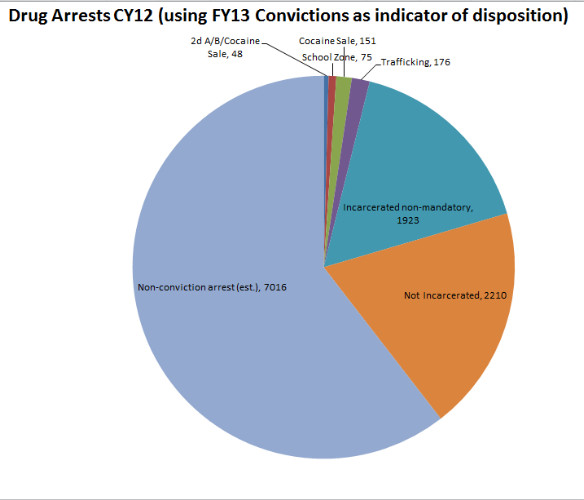According to FBI reports, there were 11,599 arrests for drug offenses in Massachusetts in calendar 2012. Using dispositions in Fiscal Year 2013 (starting six months into calendar 2012) as a proxy for the dispositions of these arrests, it appears that only 4,583 of these cases resulted in a conviction. See Survey of Sentencing Practices, FY13, Table 47. So, approximately 7,000 were disposed of without a conviction being entered — through dismissal, continuance without a finding or otherwise.
Of the 4,583 that resulted in a conviction, only 2,373 resulted in incarceration — 2,210 involved some form of probationary disposition. Finally, among the offenses resulting in incarceration, only 450 (4%) were committed to a mandatory sentence, with the most frequently occurring mandatory being the trafficking mandatory. However, it is a fair working assumption that many of the rest who were incarcerated pled guilty in return for the dropping of the charge carrying a mandatory minimum sentence.
It is worth noting that, according to the Annual Report of the Trial Court, FY14, there were a total of 42,657 “Arraignments” for drug offenses in Calendar 2012. In this report, an “Arraignment” really means a charge on a complaint. So, for example, if a person were arrested with a quantity of heroin on them after having sold a bag to an undercover officer, they might be arraigned on half a dozen charges — Distribution of Heroin, Possession with Intent to Distribute Heroin, Possession of Heroin, Knowingly being Present Where Heroin is Kept, Violation of the Controlled Substance Act in a School Zone and Conspiracy to Violate the Controlled Substance Act. These would count as six drug “arraignments” in the trial court statistics. On the other hand, some of the Trial Court drug arraignments might be incidental charges in cases involving other primary offenses — a person arrested for Assault might have heroin on their person. It is not feasible to reconcile the Trial Court “arraignment” count to the FBI arrest count, but some drug cases might originate without an arrest, so the probable true total of drug cases may be greater than the number of arrests.

